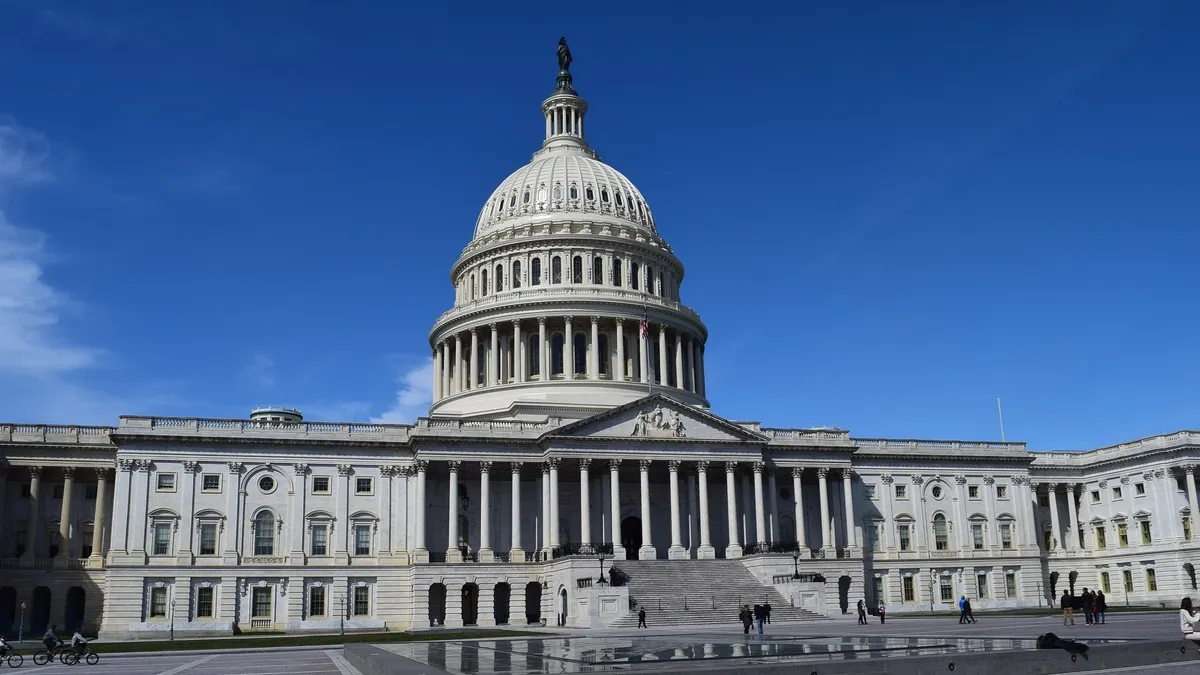Dive Brief:
- Seven U.S. senators from four New England states have urged the regional grid operator to speed the addition of clean energy resources and take a more active role in addressing climate change as well as accommodating state resource policies.
- The lawmakers are critical of recent New England ISO market actions such as its ongoing fuel security initiative, which renewables advocates say tends to benefit fossil fuel generators and ignores the benefits of cleaner resources.
- ISO New England says it will respond directly to the lawmakers, but defended its record on renewable energy and said it has allocated staff time and resources next year for stakeholder discussions about the region’s power system and its future.
Dive Insight:
ISO New England's focus on energy security has meant slower progress towards a cleaner system, ultimately allowing legacy generators to remain in place, according to the senators.
"Unfortunately, ISO-NE appears to be pursuing a patchwork of market reforms aimed at preserving the status quo of a fossil fuel-centered resource mix," they wrote in a Nov. 18 letter to ISO New England President and CEO Gordon van Welie.
The group of lawmakers pointed to recent market rule changes and specifically noted the ISO's Competitive Auctions with Sponsored Policy Resources (CASPR), a program designed to prevent state subsidized resources from depressing capacity prices.
The officials, including Democratic presidential hopefuls Sens. Bernie Sanders, I-Vermont, and Elizabeth Warren, D-Mass., say the CASPR program forces state-sponsored renewable energy to "wait for incumbent fossil fuel generators to retire before these clean resources can enter the capacity market."
They were also critical of the ISO's Inventoried Energy Program, which they say will force consumers to pay millions of dollars to existing power plants with on-site fuel supplies, such as oil, coal or liquefied natural gas. Greentech Media reports the program could mean New England consumers spend $150 million more per year on energy.
“New England states take the threat of climate change seriously and have adopted some of the most ambitious climate and clean energy laws in the country,” the senators wrote. “ISO-NE has a responsibility to facilitate this clean energy transition and help achieve the region’s climate goals in a cost-effective manner that ensures reliability and just and reasonable rates for consumers.”
Others signing the letter include Sens. Sheldon Whitehouse, D-R.I., Jack Reed, D-R.I, Richard Blumenthal, D-Conn., Ed Markey, D-Mass., Chris Murphy, D-Conn., and Angus King, I-Maine.
The Natural Resources Defense Council echoed lawmaker concerns about ISO New England's recent market actions.
The grid operator for years has implemented market rules "that ignore the benefits of clean energy and frustrate states’ efforts to address climate change," NRDC senior advocate Bruce Ho wrote in a blog post this week. He added the operator has been "hiding behind the argument that its mission is limited to ensuring reliability and fair competition, rather than achieving environmental goals."
The New England States Committee on Electricity (NESCOE) in a July letter asked the ISO to allocate resources to support state goals and said it wanted to discuss “future market frameworks that contemplate and are compatible with the implementation of state energy and environmental laws.”
The ISO also said that following NESCOE's request it allocated staff time and resources for 2020 stakeholder discussions, and those planned discussions were included as part of an Annual Work Plan presented to stakeholders in September.
In a statement, the grid operator said that over the past decade it "has worked tirelessly to incorporate renewable resources into system operations, short- and long-term planning procedures, and the region’s wholesale markets."
Those efforts allowed the region to add thousands of megawatts of renewables, according to the ISO.














